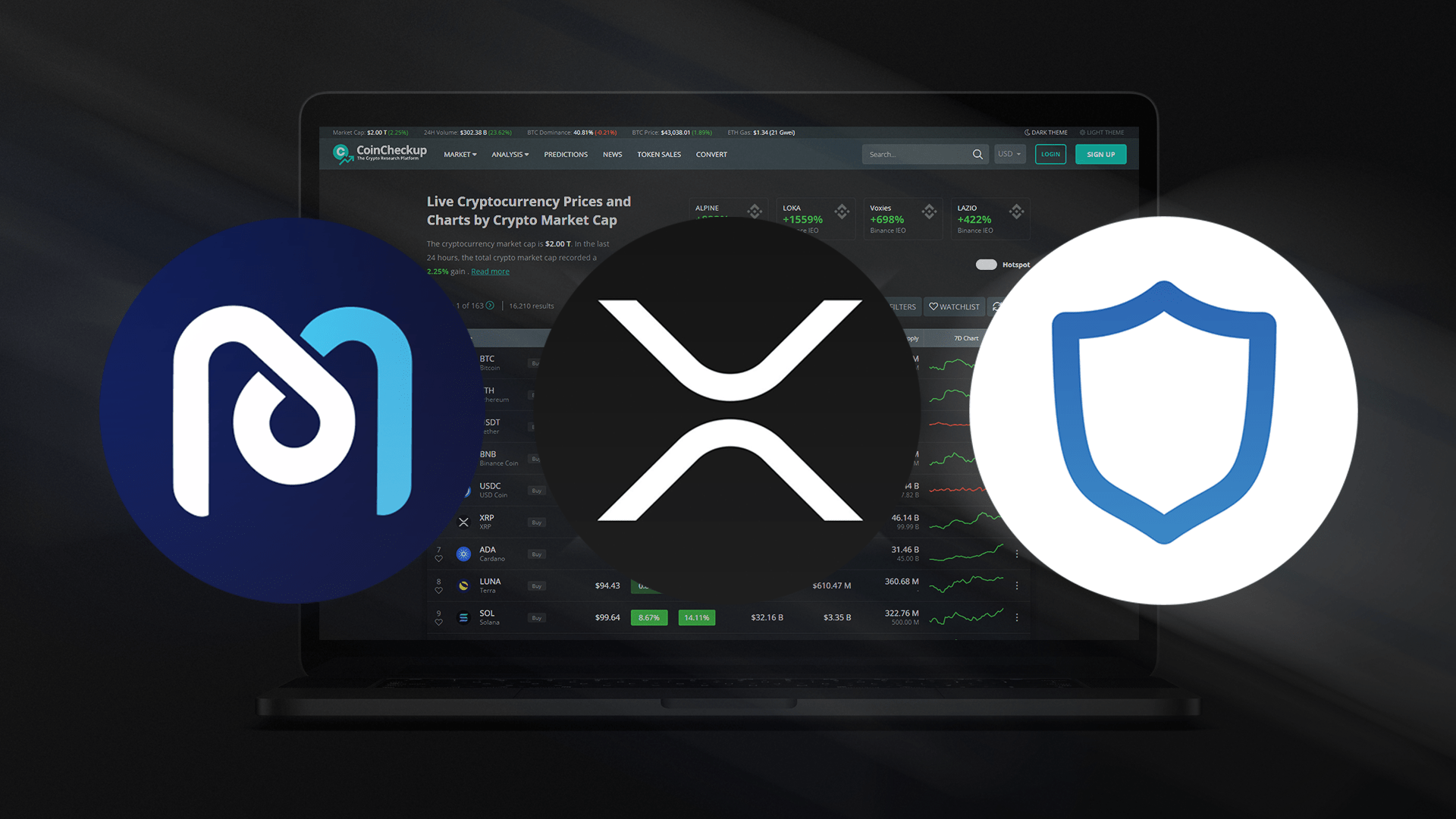
The cryptocurrency sector has entered Week 47 with a bit higher total market capitalization than last week ($840 billion on November 20 as compared to $837 billion on November 13) despite the continuation of the FTX and Alameda horror story. Throughout last week it became clearer which companies and exchanges had exposure to FTX or Alameda and are therefore in greater trouble. At the same time all centralized exchanges hurried to publish their proof-of-reserve to regain at least part of the customers’ trust. Many exchanges even encouraged their users to move crypto of their platforms if they don’t plan to actively trade with these assets. As it turns out the FTX collapse was extremely bad for the industry in the short term but would likely have a good influence over the industry in the long term as it wed out bad players in the sector and reminded the participators of the importance of decentralization.

3. Mdex (MDX)
As the name suggests, Mdex is a decentralized cryptocurrency exchange (DEX) that was funded in 2017 with an aim to deliver a revolutionary blockchain-based token trading experience. The DEX operates on the Huobi Eco Chain and utilizes the Automated Market Maker technology to fund their liquidity. The MDX token is the official governance token and native incentive token of the Mdex trading platform.
Mdex volumes spike as traders shift towards decentralized exchanges following the FTX fiasco
After the fall of FTX, many crypto holders moved their sitting digital assets to self-custody wallets, while active traders that want to minimize the risk of holding crypto on a centralized exchange started looking for decentralized exchange (DEX) alternatives. As a result, several DEXs, including Mdex, saw a considerable spike in traffic after the collapse of Alameda and FTX. Mdex platform reached a daily trading volume of $25.8 million on November 9, which represents a several-fold increase in volume compared to an average day in the preceding weeks. The increased volumes could be felt on the MDX markets as the token pumped more than 30% in the following days. Following a correction of around 20%, the token is now changing hands at $0.08, but Mdex is known for implementing innovative features, which could attract more traders in the future. For example, the Huobi Eco Chain-based exchange recently launched a USDT-margined perpetual trading feature in cooperation with on-chain derivatives platform ApolloX Finance. In addition, Mdex listed Trust Wallet Token (TWT) in its innovation zone on November 15, allowing users to collect up to 1,000% yield in MDX.

2. XRP (XRP)
XRP is a cryptocurrency that was launched in 2012 by Chris Larsen, Jed McCaleb and Arthur Britto. Ripple’s network uses a unique Ripple Protocol consensus algorithm (RPCA), which is neither proof-of-work nor proof-of-stake, to facilitate fast and cheap transactions. The maximum supply of XRP is 100 billion coins and all the coins were minted at launch of the Ripple blockchain. Back than 80% of the total XRP supply was given to fintech firm Opencoin, a company that renamed to Ripple Labs in 2015. As of today, Ripple Labs still hold more than half of the total XRP supply. However, most of the company’s XRP holdings are locked in escrow. In December 2020 Ripple became entangled in a lawsuit with the US SEC, which accuses that the company of selling unregistered securities. To this day, the legal battle between Ripple and the SEC remains one of the key factors influencing XRP’s price.
Rumours about the settlement with the SEC turned out to be false but Ripple entered partnership with Africa’s largest fintech firm
The last week’s developments around the lawsuit between Ripple and the SEC have led to bullish market activity for XRP. The token jumped by more than 10% on November 14 as rumours of a potential settlement between the SEC and Ripple have started spreading across social media. While the rumours turned out to be false, the legal battle between the two entities will have to come to an end sooner or later. And when it does, XRP markets will react accordingly. While no one really knows how the lawsuit will end, the amici briefs filed by Coinbase and other big players indicate that Ripple enjoys high support from the industry. Despite the lawsuit taking up lots of Ripple Lab’s resources, the technological development and adoption efforts have not ceased at all. Quite the opposite, actually, as Ripple has recently partnered with MFS Africa, the largest fintech company in Africa. As part of the partnership, Ripple will be used to streamline instant mobile payment for customers from 35 countries in Africa, a continent that heavily relies on mobile payment solutions.
A bit in the shadows of all the other developments, Ripple’s 6th annual Swell event took place in London and online. The two-day conference that started on November 16 hosted several important speakers including Mastercard’s Chief Digital Officer Jorn Lambert and Derrick Walton, Head of GTS Emerging Payments and Innovation at the Bank of America.

3. Trust Wallet Token (TWT)
Trust Wallet is a non-custodial decentralized crypto wallet launched in 2017 that is on a mission to simplify the safe storage of cryptocurrencies. When utilizing Trust Wallet, investors are responsible for the safekeeping of their own private keys, which also allows for the true ownership of the crypto assets. The wallet’s app is easy-to-use and supports the storage of over 8 million different coins and tokens including NFTs. In addition, many cryptocurrencies can be purchased directly on the platform through various third-party providers such as Mercuryo, MoonPay, Ramp Network, Simplex, Transak and Wyre. The Trust Wallet Token (TWT) is a BEP20 token that serves as the project’s governance token. In addition, the token can also be utilised for discounts when trading crypto or making purchases within the app. However, it must be noted that while the wallet itself is decentralized, the company that develops the Trust Wallet is owned by Binance.
Trust Wallet is becoming a leading crypto self-custody platform
We have already featured TWT in our last week’s Top 3 Coins to watch article, but due to the outstanding performance and good prospects for the future we believe that the project deserves another mention. As already described, the FTX and Alameda collapse have caused that many of the cryptocurrency investors are now far more cautious with whom they entrust their coins. In light with the saying that “sometimes, the only one who you can fully trust is yourself”, self-custody options naturally emerged as the winner in this situation, causing the tokens associated with wallet projects such as Trust Wallet (TWT), BlockWallet (BLANK), XDEFI Wallet (XDEFI), SafePal (SFP), Atomic Wallet Coin (AWC), and others to rally. Binance CEO’s tweet on how to keep your digital assets safe which highlighted the importance of self-custody, only provided additional push to the already ongoing rallies of wallet tokens. Nevertheless, we decided to put TWT as the #1 coin to watch this week due to its market cap and future prospects.
The Trust Wallet recently integrated with Binance Pay and Coinbase Pay, allowing for an easier transfer of crypto from centralized e exchanges to the decentralized self-custody wallet by eliminating the need for a manual wallet addresses input. In addition, the project announced a desktop web browser extension, which will make Trust Wallet accessible to the users of Chrome, Brave and Opera even on desktop computers. As a result of this developments the TWT has set a new ATH price of $2.73 on November 14. Even though TWT is currently trading under $2, we believe that the token is capable of reclaiming the two-dollar valuation soon.



